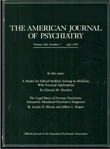Naltrexone-Induced Panic Attacks
Ms. A was a 29-year-old woman with bulimia nervosa who was enrolled in a clinical trial designed to evaluate naltrexone (100 mg/day) in the treatment of eating disorders. This patient had a family history of anxiety, but she had never suffered from any psychiatric disorder other than bulimia. Any accidental, medical, and/or recreational exposure to opiates was definitely ruled out. Before being enrolled in the study, the patient gave her written informed consent. She received 100 mg of naltrexone orally, and some hours later she experienced a state of alarm, demonstrating marked anxiety, chest discomfort, shortness of breath, profuse sweating, nausea, derealization, and fear of dying and of losing control. She was unable to stay at home alone or to go out without being accompanied. During the following 3 days she continued to take 100 mg of naltrexone as previously scheduled. However, the frequency of the panic attacks increased progressively, reaching a pattern of successive short bursts. On the fourth day, she came to the hospital in a state of alarm, manifesting fear of dying and of going crazy. She was treated with alprazolam (0.5 mg) and experienced partial relief of the symptoms. However, the day after, following a further dose of naltrexone, she experienced a relapse into bursts of panic attacks. Withdrawal of naltrexone led to complete remission of the panic symptoms in a couple of days. Since then, she has never experienced panic episodes.
References
Information & Authors
Information
Published In
History
Authors
Metrics & Citations
Metrics
Citations
Export Citations
If you have the appropriate software installed, you can download article citation data to the citation manager of your choice. Simply select your manager software from the list below and click Download.
For more information or tips please see 'Downloading to a citation manager' in the Help menu.
View Options
View options
PDF/EPUB
View PDF/EPUBGet Access
Login options
Already a subscriber? Access your subscription through your login credentials or your institution for full access to this article.
Personal login Institutional Login Open Athens loginNot a subscriber?
PsychiatryOnline subscription options offer access to the DSM-5-TR® library, books, journals, CME, and patient resources. This all-in-one virtual library provides psychiatrists and mental health professionals with key resources for diagnosis, treatment, research, and professional development.
Need more help? PsychiatryOnline Customer Service may be reached by emailing [email protected] or by calling 800-368-5777 (in the U.S.) or 703-907-7322 (outside the U.S.).

